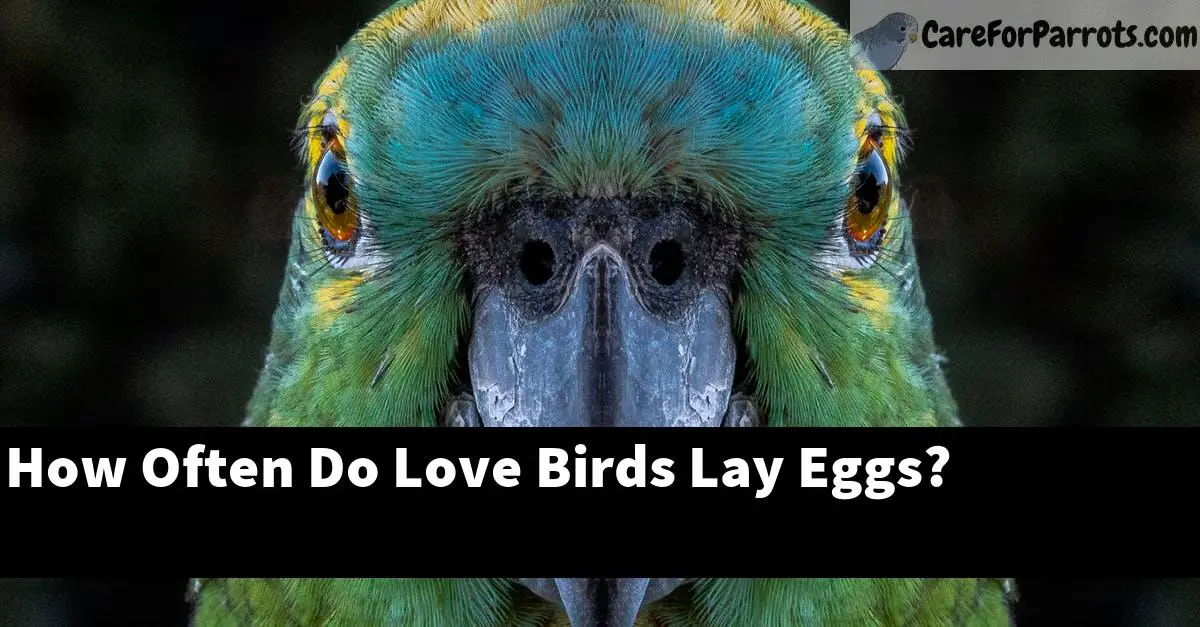Birds are fascinating creatures, and their breeding habits can be particularly intriguing, especially when it comes to lovebirds. These colorful, social birds are known for their strong pair bonding and affectionate behaviors, hence the name “lovebirds.” In this article, we’ll explore the reproductive cycle of lovebirds, including how often they lay eggs, factors that influence egg-laying, and how to ensure their well-being during this critical period.
If you’re curious about the reproductive habits of lovebirds, you might be surprised to learn that these birds can lay eggs quite frequently. However, there’s more to the story than just numbers, so let’s dive into the details and unravel the mystery of lovebird egg-laying.
Ready to embark on this journey into the world of lovebirds? Keep reading to learn more about their egg-laying habits, as well as tips for keeping your lovebird happy and healthy during this important stage in their life.
Table of Contents
How Lovebirds Lay Eggs?
Lovebird Mating Behavior
Lovebirds form strong monogamous bonds and often mate for life. Their mating rituals involve mutual preening, bill-fencing, and feeding each other, which strengthens their bond. Once a pair of lovebirds has mated, the female will begin preparing to lay eggs by building a nest.
Nest Building and Egg Preparation
The female lovebird plays a crucial role in constructing the nest, using materials like leaves, twigs, and grasses. She’ll meticulously weave these materials together to create a cozy space for her eggs. Once the nest is complete, the female will lay her eggs, typically one every other day, until she has laid her full clutch.
Frequency of Egg Laying
Lovebirds can lay eggs quite frequently, depending on several factors. On average, they lay eggs every 3-5 weeks, but this can vary depending on the individual bird and its environment.
Factors Affecting Egg Laying
Various factors can influence how often lovebirds lay eggs, including their age, health, diet, and the availability of suitable nesting sites. Additionally, environmental factors such as temperature, humidity, and light exposure can impact their breeding habits.
Age and Health
Younger, healthy lovebirds tend to lay eggs more frequently than older or unhealthy birds. Lovebirds reach sexual maturity around 6-9 months of age, and their egg production typically decreases as they age.
Diet and Nutrition
A balanced diet plays a significant role in the frequency of egg-laying in lovebirds. A diet rich in calcium and essential nutrients helps ensure that the birds remain healthy and can lay eggs more regularly.
Environmental Factors
Lovebirds are sensitive to environmental changes, and factors such as temperature and humidity can impact their breeding habits. Providing a stable environment with appropriate temperature and humidity levels can help encourage more consistent egg-laying.
Caring for Lovebirds During Egg Laying
Providing a Proper Nesting Site
To encourage healthy egg-laying, it’s essential to provide your lovebirds with a suitable nesting site. This could be a nesting box or a natural nest made from safe materials, such as twigs and grasses.
Supporting a Nutritious Diet
Ensure your lovebirds have access to a well-balanced diet, including calcium-rich foods like cuttlebone, mineral blocks, or calcium supplements. This helps support healthy egg production and the overall well-being of your birds.
Monitoring the Birds’ Health
Regularly observe your lovebirds for any signs of illness or distress, as these can impact their ability to lay eggs. If you notice any unusual behaviors, consult with an avian veterinarian for advice and treatment options.
Balancing Human Interaction and Privacy
While lovebirds can be very social and enjoy human interaction, it’s essential to provide them with enough privacy during the egg-laying period. Avoid handling the birds or disturbing their nest too frequently, as this can cause stress and negatively affect their breeding habits.
Maintaining Environmental Stability
Maintaining a stable environment for your lovebirds is crucial during egg-laying. Keep the temperature within a comfortable range of 70-80°F (21-27°C) and maintain humidity levels between 40-60%. Also, ensure that they receive a consistent amount of natural or artificial light, as this helps regulate their reproductive cycles.
Conclusion
In conclusion, lovebirds can lay eggs quite frequently, with an average interval of 3-5 weeks between clutches. Factors such as age, health, diet, and environment can significantly impact their egg-laying habits. To ensure the well-being of your lovebirds during this period, it’s essential to provide them with a proper nesting site, a balanced diet, and a stable environment. Monitoring their health and giving them privacy can also contribute to their overall happiness and reproductive success.
FAQ
Q1: How many eggs do lovebirds lay in a clutch?
A1: Lovebirds typically lay 4-6 eggs in a clutch, but this number can vary depending on the individual bird and its environment.
Q2: How long does it take for lovebird eggs to hatch?
A2: Lovebird eggs usually hatch within 21-23 days after being laid, with the chicks emerging from their shells fully developed and ready to be fed by their parents.
Q3: How can I tell if my lovebird is ready to lay eggs?
A3: Signs that your lovebird may be ready to lay eggs include increased nest-building activity, changes in appetite, and the female spending more time in the nest.
Q4: Do lovebirds need a nesting box?
A4: Providing a nesting box can help encourage healthy egg-laying in lovebirds, as it offers them a safe and comfortable place to lay their eggs and raise their chicks.
Q5: Can I prevent my lovebirds from laying eggs?
A5: It’s challenging to prevent lovebirds from laying eggs altogether, but you can take steps to discourage excessive egg-laying, such as adjusting their diet, altering their environment, or consulting with an avian veterinarian for further guidance.






